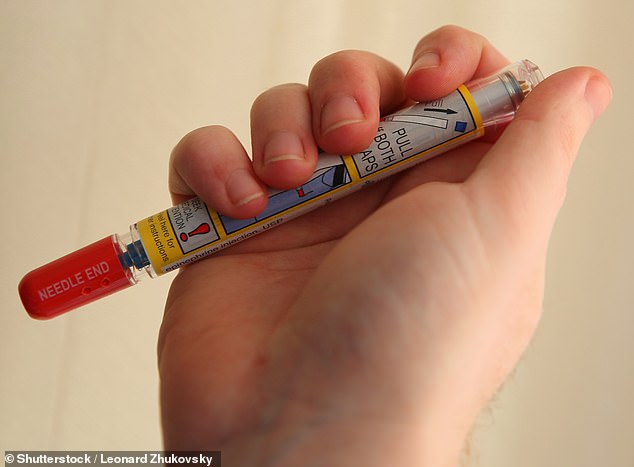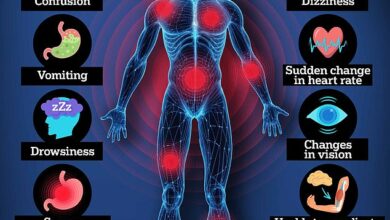Food allergies in Britain have DOUBLED in a decade, but a third of sufferers do not have potentially life-saving EpiPens, a major analysis has found




New research shows that the number of food allergies has more than doubled in ten years.
Analysis of more than 13 million patients in the UK shows rates have risen sharply, but around a third of patients do not have a potentially life-saving EpiPen.
Preschool-aged children are at greatest risk: 4 percent of children under five are likely to have an allergy, compared with about 1 percent of adults.
Experts say the increasing prevalence highlights the importance of ensuring that GPs and other community staff, such as daycare workers, are adequately trained to care for people at risk of serious food allergy.
Food allergies occur when the immune system overreacts to certain foods, such as peanuts, eggs, cow’s milk, or shellfish.

The findings follow recent high-profile cases, such as that of 13-year-old Hannah Jacobs (pictured), who tragically died within hours of sipping a Costa Coffee hot chocolate containing cow’s milk in 2022.

Earlier this month, a coroner noted that ‘neither Hannah nor her mother had an epi-pen with them as prescribed’ on the day she died. Hannah’s mother, Abimbola Duyile, is pictured holding a photo of her daughter outside East London Coroner’s Court earlier this month
In severe cases, anaphylaxis can occur. This can cause swelling of the airways, difficulty breathing and cardiac arrest if not treated promptly.
In the largest real-world study of allergies in the UK, researchers from Imperial College London analysed GP and hospital data on incident allergies between 2008 and 2018.
They found that the number of new cases of probable food allergies doubled during this period, from 76 to 160 cases per 100,000—a jump from 0.4 to 1.1 percent of the population—before leveling off.
Among children and adolescents under 20, the rate rose from nearly 1 percent to 2.41 percent, according to findings published in the journal Lancet Public Health.
Children under the age of five had the highest ‘probable’ allergy rates in 2018, at 4 percent, compared with 2.4 percent in those aged 5 to 9, 1.7 percent in those aged 15 to 19, and 0.7 percent in adults.
This is an increase of 1.2, 0.9, 0.8 and 0.2 percent respectively.
Scientists say the number of new cases is falling, possibly due to changes in infant feeding guidelines that no longer recommend delaying the introduction of foods like peanuts to infants or those at increased risk of allergies.
Lead author Dr Paul Turner, professor of paediatric allergy at Imperial College London, said: ‘This new analysis paints an important, albeit mixed, picture of food allergies in the UK.
The good news is that while the number of food allergies has increased, the number of new cases occurring each year appears to be leveling off.
‘However, more than a third of patients at risk of serious reactions do not carry potentially life-saving adrenaline auto-injectors, such as EpiPens.
‘We need to address this urgently and better support GPs and primary care providers, who ultimately care for the vast majority of patients with food allergies in the UK.’
Most patients, including those with a previous anaphylaxis, were seen in primary care settings, such as a GP practice, and only one in ten had been seen by a specialist in hospital at least once in the past ten years.
It is estimated that 64 percent of children and young people are prescribed adrenaline auto-injectors, compared to only 55 percent of adults. It is also less common in people living in deprived areas of the country.
The findings follow recent high-profile cases, such as that of 13-year-old Hannah Jacobs, who tragically died in 2022 within hours of sipping a Costa Coffee hot chocolate containing cow’s milk.

Prescriptions for adrenaline auto-injectors (pictured) in people with a previous anaphylaxis were estimated at 64 per cent for children and young people and only 55 per cent for adults. They were also less common in people living in deprived areas of the country.
Earlier this month, a coroner noted that “neither Hannah nor her mother had the prescribed EpiPen with them” on the day she died.
Dr Turner added: ‘Food allergies can have a huge impact on people’s lives and in some tragic cases even shorten their lives.
‘By better understanding the prevalence of food allergies in the UK and working with affected people, their families, scientists and clinicians, we are working together to reduce their impact.’
The cause of the increase is unknown. One theory is that it could be partly due to increased awareness, while other theories suggest it could be due to reduced exposure to germs and changes in gut bacteria.
Advice on allergen exposure has also changed over the years, with parents now being told to introduce their child to allergenic foods as early as possible.
Until 2009, it was officially illegal to give peanuts to children with a family history of peanut allergy until they were at least three years old. And everyone else until they were at least one year old. However, experts now advise getting them used to small doses as early as possible.




